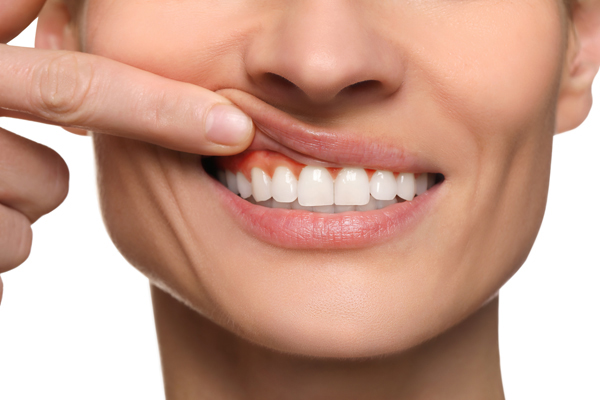The Stages of Gum Disease

Most adults experience some degree of gum disease during their lifetime, but it does not necessarily lead to tooth loss. Understanding how to identify and treat the stages of this common ailment can prevent it from spreading and reduce its impact.
What is gum disease?
Gum disease is an infection of the gum tissue surrounding the teeth. It starts with a build-up of bacteria that form a sticky substance called plaque over the teeth. The trapped food particles feed bacteria that migrate to the gums, eventually causing the following symptoms:
- Swelling and pain
- Redness and bleeding
- Loose teeth
- Persistent bad breath
- Foul taste in the mouth
- Change in bite
What are the stages of gum disease?
There are four stages of infection that a dentist can identify. The stage determines the treatment.
Gingivitis
The earliest manifestation of gum disease is gingivitis, characterized by bleeding gums and bad breath. Unless there is pain or discomfort, people often ignore these symptoms. Fortunately, gingivitis is reversible with professional dental cleanings and rigorous home care.
Early periodontitis
Swelling and bleeding during flossing are symptomatic of early-stage periodontitis. Bacteria cause gaps between the teeth and gums and begin to wear away at the supporting bone. This condition cannot be reversed, but it is possible to prevent further progression by increasing the frequency of deep dental cleanings and diligent home care efforts.
Moderate periodontitis
Painful gums that bleed or ooze pus indicate moderate periodontitis. Pockets between the teeth and gums deepen, and bone loss increases. Gums also begin to recede, exposing tooth surfaces that they usually cover. Cleaning and scaling are necessary to prevent bacteria from migrating to the bloodstream.
Advanced periodontitis
Pain, bleeding, and severe bone and tooth loss occur at this stage. Surgical intervention is necessary to remove bacteria from deep pockets. Patients have a much higher risk of systemic health problems caused by bacteria entering the bloodstream.
Who is at risk?
Gum disease generally increases with age, and it is relatively common among the elderly. Others who are especially susceptible include:
Anyone with an autoimmune disease
Autoimmune diseases can cause symptoms that manifest in the mouth and affect the teeth. For example, patients with Sjogren's syndrome cannot produce adequate saliva flow to wash away bacteria-breeding food particles. These patients may experience any stage of gum disease.
Anyone who smokes
Smoking can adversely affect the immune system, preventing it from combating oral bacteria. For this reason, the progression to late-stage periodontal disease can be rapid among smokers.
Women experiencing hormone changes
Hormonal changes at various life stages and pregnancy can cause increased blood flow to the gums, decreased saliva production, bone loss, and an inability to fight infection. The consequences range from reversible gingivitis to permanent tooth loss.
Anyone with poor oral hygiene
Most dentists advise their patients to brush at least twice per day and floss at least once per day. Individuals who fail to follow these guidelines are vulnerable to advanced gum disease from an accumulation of oral bacteria.
Conclusion
Regular dental check-ups and cleanings and diligent home care can identify early-stage gum disease and keep it from advancing. A healthy mouth can also prevent a wide range of unwanted complications throughout the body.
Request an appointment here: https://www.cityviewdentalomaha.com or call City View Dental at (402) 401-4556 for an appointment in our Omaha office.
Check out what others are saying about our dental services on Yelp: Gum Disease in Omaha, NE.
Related Posts
Severe tooth decay or damage is often treatable through root canal therapy. Despite its reputation, undergoing a root canal is similar to filling a cavity and is generally no more uncomfortable. Learning about the procedure and the recovery process can help alleviate concerns, helping patients see the benefits of preserving their smile with a root…
You have probably heard about dental implants and how this tooth-replacement option can restore your smile. Dentures are another treatment that patients with multiple missing teeth can benefit from. Your dentist can also combine the two by providing implant-supported dentures. There are reasons that this method offers advantages over traditional dentures.Both types of dentures come…
Deep dental cleaning is a way to treat severe cases of gum disease. However, it is not always necessary for all cases of gum disease. By understanding when and why a dentist recommends a deep dental cleaning, you can feel more comfortable throughout the consultation and treatment process. Every dentist utilizes deep dental cleaning differently and…
Implant supported dentures are becoming a popular tooth replacement option. They are known to replace entire arches of teeth, whether it be the top or bottom. However, because tooth replacement can be complex, many individuals are curious as to how successful the process is for upper teeth. Continue reading to find out! Below is a quick…
